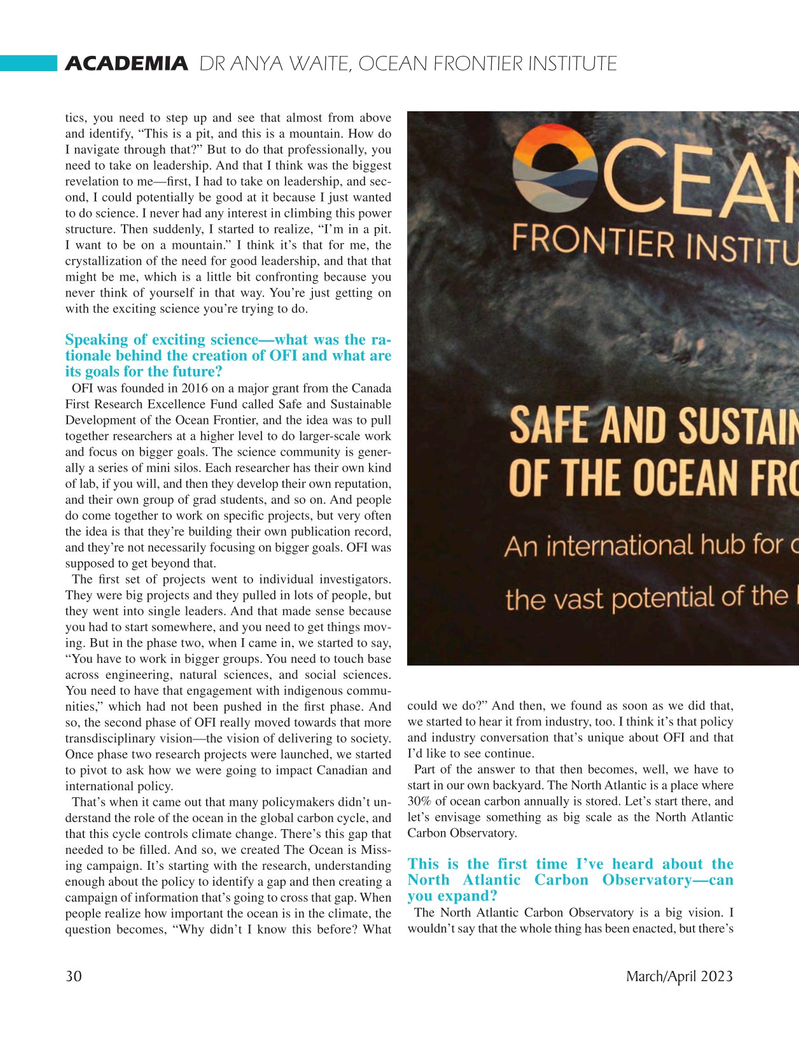
Page 30: of Marine Technology Magazine (March 2023)
Read this page in Pdf, Flash or Html5 edition of March 2023 Marine Technology Magazine
ACADEMIA DR ANYA WAITE, OCEAN FRONTIER INSTITUTE tics, you need to step up and see that almost from above and identify, “This is a pit, and this is a mountain. How do
I navigate through that?” But to do that professionally, you need to take on leadership. And that I think was the biggest revelation to me—? rst, I had to take on leadership, and sec- ond, I could potentially be good at it because I just wanted to do science. I never had any interest in climbing this power structure. Then suddenly, I started to realize, “I’m in a pit.
I want to be on a mountain.” I think it’s that for me, the crystallization of the need for good leadership, and that that might be me, which is a little bit confronting because you never think of yourself in that way. You’re just getting on with the exciting science you’re trying to do.
Speaking of exciting science—what was the ra- tionale behind the creation of OFI and what are its goals for the future?
OFI was founded in 2016 on a major grant from the Canada
First Research Excellence Fund called Safe and Sustainable
Development of the Ocean Frontier, and the idea was to pull together researchers at a higher level to do larger-scale work and focus on bigger goals. The science community is gener- ally a series of mini silos. Each researcher has their own kind of lab, if you will, and then they develop their own reputation, and their own group of grad students, and so on. And people do come together to work on speci? c projects, but very often the idea is that they’re building their own publication record, and they’re not necessarily focusing on bigger goals. OFI was supposed to get beyond that.
The ? rst set of projects went to individual investigators.
They were big projects and they pulled in lots of people, but they went into single leaders. And that made sense because you had to start somewhere, and you need to get things mov- ing. But in the phase two, when I came in, we started to say, “You have to work in bigger groups. You need to touch base across engineering, natural sciences, and social sciences.
You need to have that engagement with indigenous commu- nities,” which had not been pushed in the ? rst phase. And could we do?” And then, we found as soon as we did that, so, the second phase of OFI really moved towards that more we started to hear it from industry, too. I think it’s that policy transdisciplinary vision—the vision of delivering to society. and industry conversation that’s unique about OFI and that
Once phase two research projects were launched, we started I’d like to see continue.
to pivot to ask how we were going to impact Canadian and Part of the answer to that then becomes, well, we have to international policy. start in our own backyard. The North Atlantic is a place where
That’s when it came out that many policymakers didn’t un- 30% of ocean carbon annually is stored. Let’s start there, and derstand the role of the ocean in the global carbon cycle, and let’s envisage something as big scale as the North Atlantic that this cycle controls climate change. There’s this gap that Carbon Observatory.
needed to be ? lled. And so, we created The Ocean is Miss-
This is the first time I’ve heard about the ing campaign. It’s starting with the research, understanding
North Atlantic Carbon Observatory—can enough about the policy to identify a gap and then creating a you expand?
campaign of information that’s going to cross that gap. When people realize how important the ocean is in the climate, the The North Atlantic Carbon Observatory is a big vision. I question becomes, “Why didn’t I know this before? What wouldn’t say that the whole thing has been enacted, but there’s 30 March/April 2023
MTR #3 (18-33).indd 30 3/17/2023 6:03:44 PM

 29
29

 31
31
